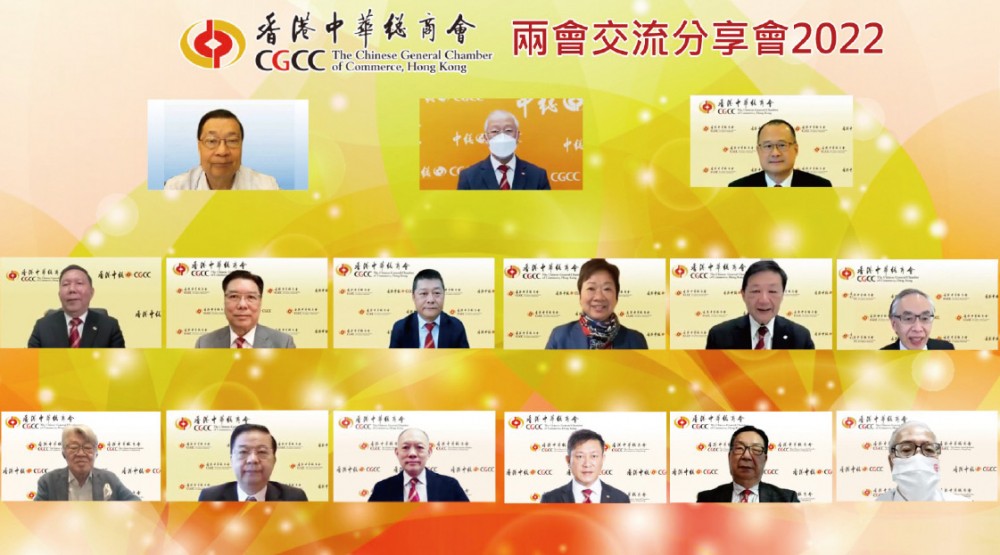At the 2022 NPC & CPPCC Exchange and Sharing Meeting, Tam Yiu-chung, NPC Standing Committee Member and several members of the Chamber who serve as NPC Deputies and CPPCC National Committee Members jointly discussed the key guiding principles and policy directions of this year’s “Two Sessions”, as well as the implications for Hong Kong’s future.
Tam Yiu-chung: Stability is the top priority for national development
 Amid the impact of the epidemic in the past year, while many countries experienced negative growth, China’s economic performance remained strong with an annual growth rate of 8.1%. Tam Yiu-chung said that following last year’s recovery momentum, the country’s economic structure will continue to be optimised, and reform and opening-up will continue to deepen. This year, upholding the underlying principle of making stability the top priority and pursuing progress while ensuring stability, the country will focus on stabilizing the macro economy, with the GDP likely to grow by about 5.5% this year.
Amid the impact of the epidemic in the past year, while many countries experienced negative growth, China’s economic performance remained strong with an annual growth rate of 8.1%. Tam Yiu-chung said that following last year’s recovery momentum, the country’s economic structure will continue to be optimised, and reform and opening-up will continue to deepen. This year, upholding the underlying principle of making stability the top priority and pursuing progress while ensuring stability, the country will focus on stabilizing the macro economy, with the GDP likely to grow by about 5.5% this year.
For epidemic prevention and control, the country will continue effective routine COVID-19 control, adhere to preventing inbound cases and domestic resurgences, continually refine epidemic containment measures, and strengthen epidemic controls in port-of-entry cities. It will also accelerate R&D of new vaccines and effective medicines, continue implementing vaccination programs, better leverage the unique role of traditional Chinese medicine, deal with occurrences of local cases in a scientific and targeted manner, and ensure the normal order of work and life.
Tam added that the core idea of this year’s Report on the Work of the Government in relation to Hong Kong is to maintain firm commitment to the policy of “One Country, Two Systems” in a comprehensive, targeted and unwavering manner, because this is the best political arrangement for Hong Kong. The report also stressed that the Central Government will exercise overall jurisdiction over Hong Kong, once again showing that all the powers of Hong Kong come from the Central Government, which is a consensus that the people of Hong Kong must establish.
This year’s NPC also adopted the new Measure for Election of Deputies of the HKSAR to the NPC, under which a new Election Council will be formed based on the current Election Committee, and will be responsible for electing the new NPC deputies for Hong Kong. In Tam’s view, this is mainly aimed at upholding the principle that Hong Kong should be governed by patriots and ensuring that all those elected are firm patriots, while Election Committee members are representative of a considerably broad cross-section of the people. This arrangement is conducive to the overall interests and stable development of the Hong Kong society.
Jonathan Choi: Fostering quality advice
 Speaking of CPPCC Chairman Wang Yang, Jonathan Choi, the Chamber’s Permanent Honorary President (CPPCC National Standing Committee Member) shared that Wang has upheld the two main themes, namely unity and democracy, in the CPPCC work report. Wang rode on two driving forces of advising the government and converging common consensus, setting the stage for the 20th National Congress of the CPC. Wang further proposed to celebrate the centenary of the Communist Party of China and to extend the study of the history of the CPC, so as to elevate the patriotic sense and constructive competence for the country, for Hong Kong and for Macao. These would enable a good start for the “14th Five-year” Plan. Quantity and quality are both important to CPPCC proposals, as quality advice will support quality growth. This year, Choi submitted 12 proposals on Guangdong-Hong Kong-Macao Greater Bay Area (Greater Bay Area) and other topics. The government work report, on the other hand, focuses on stabilizing employment, safeguarding people’s livelihood and preventing risks. The government will operate leanly, and dual circulation will be employed to promote economic development through policies that will benefit businesses and Chinese nationals. Businesses will enjoy ample opportunities from the coordinated regional development, elderly economy, three-child policy, as well as vitalizing traditional Chinese medicine strategies, as mentioned in the work report.
Speaking of CPPCC Chairman Wang Yang, Jonathan Choi, the Chamber’s Permanent Honorary President (CPPCC National Standing Committee Member) shared that Wang has upheld the two main themes, namely unity and democracy, in the CPPCC work report. Wang rode on two driving forces of advising the government and converging common consensus, setting the stage for the 20th National Congress of the CPC. Wang further proposed to celebrate the centenary of the Communist Party of China and to extend the study of the history of the CPC, so as to elevate the patriotic sense and constructive competence for the country, for Hong Kong and for Macao. These would enable a good start for the “14th Five-year” Plan. Quantity and quality are both important to CPPCC proposals, as quality advice will support quality growth. This year, Choi submitted 12 proposals on Guangdong-Hong Kong-Macao Greater Bay Area (Greater Bay Area) and other topics. The government work report, on the other hand, focuses on stabilizing employment, safeguarding people’s livelihood and preventing risks. The government will operate leanly, and dual circulation will be employed to promote economic development through policies that will benefit businesses and Chinese nationals. Businesses will enjoy ample opportunities from the coordinated regional development, elderly economy, three-child policy, as well as vitalizing traditional Chinese medicine strategies, as mentioned in the work report.
Choi also shared that when CPPCC National Committee Members met with Vice Premier Han Zheng, it was mentioned that the central government fully supports the HKSAR government’s battle against the pandemic. Economically, the central government supports the HKSAR in planning long-term development, in establishing a financial innovation hub, and in resolving the inadequacies of people’s livelihood. The Director of the Hong Kong and Macao Affairs Office of the State Council Xia Baolong stressed that the central government’s jurisdiction over Hong Kong will not affect its implementation of the policy of “Hong Kong people administering Hong Kong with a high degree of autonomy”. He also pointed out five expectations for patriotic governors, who should bring faith, integrity, commitment, competence and practical work to their roles. Furthermore, Choi reckoned that the special mentioning of smart courts in the work reports of the Supreme People’s Court and the Supreme People’s Procuratorate underscored the unique Chinese wisdom in the mainland’s judicial model.
National Visions Presented in “Two Sessions”

A number of discussion panels were planned for this exchange session, during when many of the Chamber’s members, who are also NPC deputies or CPPCC National Committee Members, shared their experiences as “Two Sessions” attendees. They are most impressed with the Country’s visionary ideas in economic development as well as pandemic prevention and control.
Ricky Tsang, the Chamber’s Vice-Chairman (CPPCC National Committee Member), said that the epidemic has caused young people in Hong Kong to pay less attention to the Greater Bay Area. Therefore, he suggested the governments and youth groups of Guangdong Province and the HKSAR to jointly build an online platform for youth exchanges in the Greater Bay Area, with the purpose of providing useful information for Hong Kong’s young people who are interested in starting businesses and seeking employment in the Greater Bay Area. Tsang also noticed that many Hong Kong people furthering their career in the Greater Bay Area are very concerned about the pathway for their children to attend school in the Mainland, and school places for Hong Kong children in the Greater Bay Area are in short supply. Therefore, he suggested to set up more schools for Hong Kong and Macao children in the Greater Bay Area to resolve the issue of them attending school and enable them to understand the national situation at an early stage.
Han Zheng, Vice-Premier of the State Council, expressed the Central Government’s high level of concern and care for the epidemic situation in Hong Kong as he met with HKSAR deputies to the NPC, making it clear that it will take in all of Hong Kong’s requests for help. Tommy Li, the Chamber’s Vice-Chairman (NPC Deputy), said that the Central Government’s care and attention for Hong Kong is like a long-awaited boost, for which the people of Hong Kong should be grateful. With regard to Hong Kong’s future, he encouraged the patriotic camp to speak out more. In particular, they must unite their voices against some false and slanderous rhetoric, and avoid self-inflicted chaos among themselves. Coupled with the unlimited support from the Central Government, Hong Kong will certainly emerge from the difficulties as long as it is better integrated into national development.
Listing his work for the NPC over the last year, Herman Hu, the Chamber’s Vice-Chairman (NPC Deputy) drafted, deliberated, and amended a few laws. NPC deputies also made around 9,000 suggestions in total. The proposals that Hu put forward to the “Two Sessions” covered a range of areas, from promoting the food culture of China, improving student’s health awareness to strengthening technology education, as well as fostering national science and research development, etc. This year’s “Two Sessions” has enabled Hu to experience an effective Chinese-style governance model that could drive social and economic development. This is not only supported by the people, but also meets the State’s development needs. It has fully illustrated the Country’s growth direction by always putting people first and then by seeking improvement amidst stability.
Disease prevention and control is close the heart of Charles Cheung, the Chamber’s Vice-Chairman (CPPCC National Committee Member), who supports the Country’s adoption of the dynamic zero COVID-19 strategy to maximize the efficiency with minimal impact. Hong Kong deputies unanimously agree that the dynamic zero strategy suits Hong Kong’s actual circumstances, and could help reduce serious cases and fatality rate, which in turn alleviates the burden onto our healthcare system. Stringent anti-virus measures would inevitably affect the day-to-day living of the public and business operation. However, in the long run, this is the quickest route to end the pandemic and to provide the maximum protection the citizen’s health and livelihood. This is the shortest path for our society to resume normal external connections and will be conducive to the long-term stability and development of Hong Kong.
David Fong, the Chamber’s Life Honorary Chairman (CPPCC National Committee Member), pointed out that the government’s work report placed a titular focus on “stability” in the face of internal and external challenges. One of the main features is to reduce tax and fees to help companies weather through the difficult situation. Fong trusts that the current state policy, which is to enhance the “four consciousnesses”, to cement the “four confidences”, as well as to actualize the “two upholds”, should be able to cope with the downward economic pressure.




